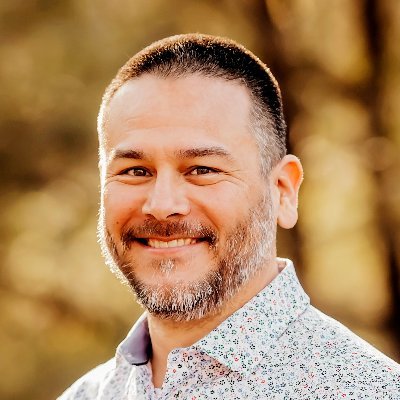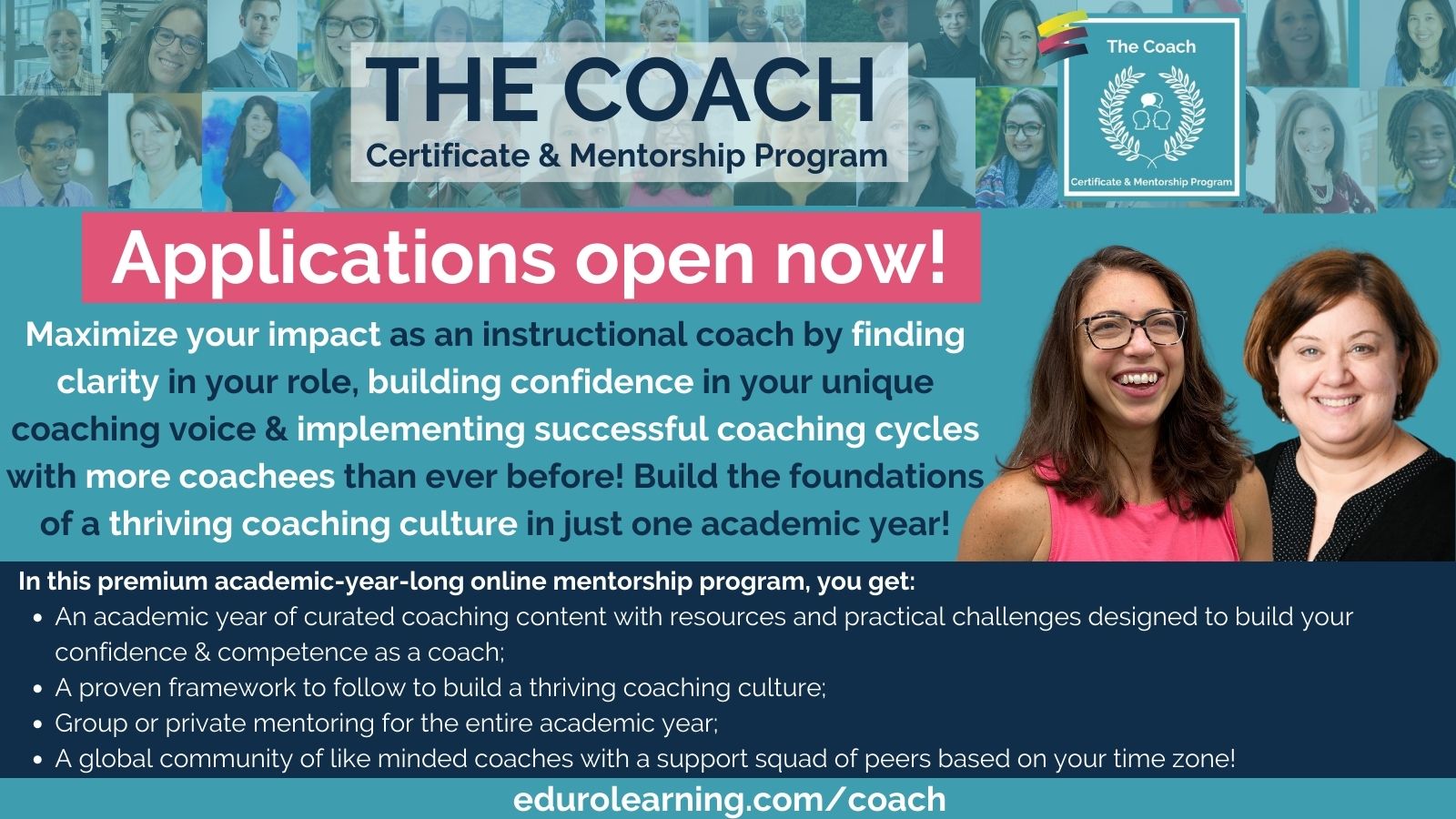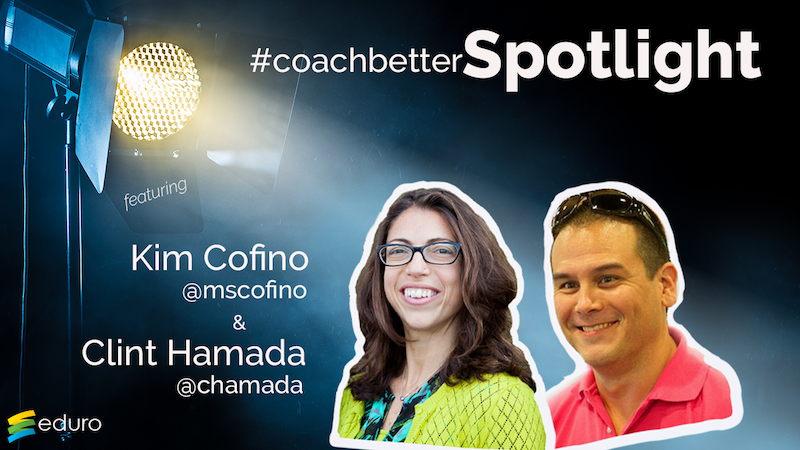In this episode Clint and Kim are chatting about a question we received in our #coachbetter Facebook group: How do you get feedback on your coaching? In true Clint and Kim style, we expanded on this initial question to dig a little deeper into the purpose and value of feedback, and the ways that we can seek out a critical friend (both within and beyond our immediate school community) to reflect on the feedback we receive. As coaches, it’s critical that we demonstrate our commitment to professional growth, and our conversation today builds a potential process that all coaches can use to track, reflect on and learn from feedback on their coaching!
Subscribe to #coachbetter via your favorite Podcast Player!
Featured Guests


Bonus! Watch the Spotlight Version on YouTube!
Show Notes
Why is feedback important? / Do you ask for feedback as a coach?
Feedback is super important for all community members in a school. We need to hear how we are meeting the needs of the teachers we’re working with. We need to hear our blind spots, that we may not even be thinking about. How are your peers or supervisors helping you to see some of those blind spots?
Talking about coaching challenges with other coaches can be a great informal way to open your eyes to potential blind spots?
What would you want feedback on as a coach? / What would be valuable / helpful feedback?
Important to truly understand your role as a coach, so you can determine what you need feedback on. What are the “look fors?” for me as a coach.
Knowledge / Skills: Effectiveness at implementing a new program, ability to answer questions, solve problems
Behaviors / Attitudes / Environment: Approachability, Flexibility, Inviting, open ended, starting where the teacher is, helping teachers define their goals, collaborative, responsive
Vision / Leadership: purpose clear to teachers, vision for learning evident
Could build off the 10 roles of a coach from Joellen Killion
Resource provider, data coach, curriculum specialist, data coach, learning facilitator, school leader, change catalyst, learner
How do you get feedback on your coaching? (Ann Hoffman)
Important to remember that you only need one data point to help you re-evaluate your practice.
Critical to be honest about the feedback you receive. Rather than saying “it’s just one person,” remember that it’s a big deal to that one person”
This may help you set some goals, and get feedback on that new goal
It’s important to have a critical friend to discuss the results of this feedback with. Both within the school, someone who knows the intricacies, and someone outside the school who doesn’t know the internal issues and politics to ask some clarifying questions to help you reflect.
Never discount your network, both inside & outside the school to support you. They can be a sounding board to help you reflect on your practice.
Important to remember to be vulnerable in asking for genuine feedback. It’s not for a “pat on the back”, it’s to help me grow and get better in my practice. Need to be vulnerable in asking sounding board for support too.
Being genuine and vulnerable is what we ask teachers to do when they work with us as coaches. Modeling this behavior is as coaches is critical.
3 data points:
- Ask colleagues to give feedback on the elements of your role (based on the job description / outside resources about the role of a coach)
- Ask colleagues to describe your role
- Ask colleagues what they would like you to do
Scaled / layers of feedback
- In every coaching conversation, ask what was most helpful today? What could / should I / we change?
- As a coaching cycle is ending, giving them some very specific questions (let them know you’ll be asking for feedback at the beginning of the cycle so they know what to look for)
- Targeted survey twice a year (similar to a 360 evaluation): send to a specific group of people
Goal: Get the data, design an intervention or plan, act on the data, get more data after action to see if there was any improvement.
Important to record the data so that you can make sense of it. What do you think is going to be helpful? What data do you want from your evaluator?
Don’t feel like you have to design a perfect system from the beginning. It can be a prototype.
Commitment to self-improvement: Document or Journal to record the information you receive, from that you’re taking action based on the information you’re given. It’s hard and time-consuming, but if you truly believe you’re working to get better, it’s time well spent.
Commitment to self-improvement: Being aware, making changes to your practice, so you can better support your colleagues.
Going through this process, helps get rid of the disconnect between teachers and coaches and students.
How are you modeling the work of a learner as a coach? Including reflecting.
Similarities and differences to the type of feedback you might get as a classroom teacher vs a coach?
Self-reflection / improvement
- Find an internal and external reflective partner (what’s the difference between the two? What’s the feeling of the difference between the two?)
- How are you gathering data?
- How are you finding those blind spots?
- What are some data you want to gather?
- How are you going to design an intervention for the data?
- How are you going to make decisions based on that data?
- Build your own feedback survey
Level Up Your Coaching with The Coach!
If you are ready to dive deep into your coaching practice, to help you #coachbetter and build a thriving coaching culture in your school, please join us for our next cohort of The Coach!
Wherever you are in building a coaching culture in your school, The Coach will give you the strategies, skills and tools you need to make coaching a success and will empower you to confidently apply instructional coaching strategies in any situation – from building a coaching program, to having coaching conversations, to being a leader in your school community. We facilitate only one cohort each academic year so we can offer individualized support for each participant.
Coaches of all levels are welcome: you’ll start the program with a self-assessment to determine exactly what the next steps are for you!
Registration for our next global cohort opens once a year – check the website for details!






Recent Comments